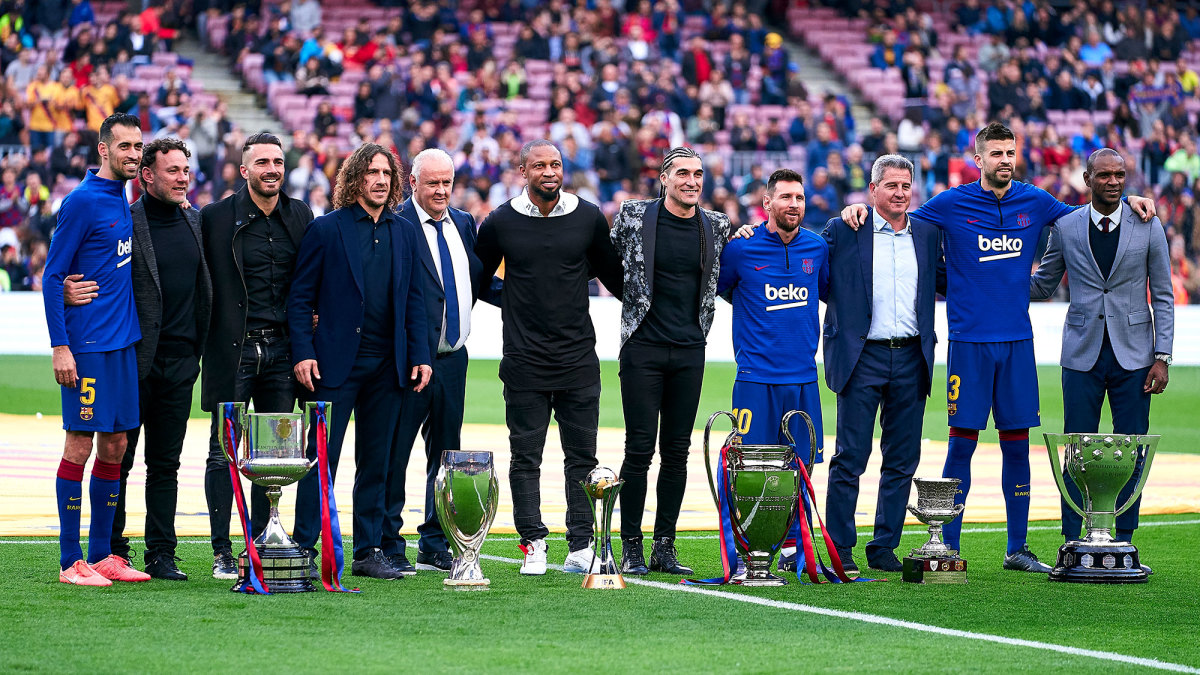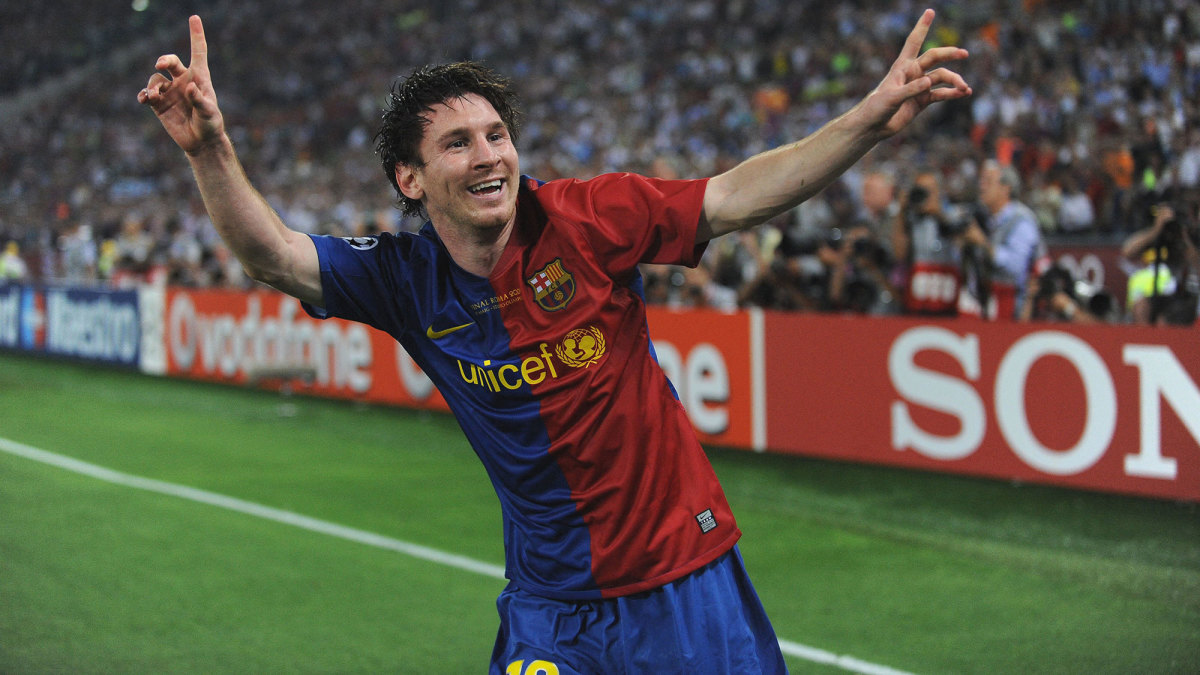Comparing the Sextuple Winners: 2009 Barcelona vs. 2020 Bayern Munich
"Maybe I can call Messi & Co., and we can play for the seventh title? So tell me when and where, and we will be there." - Pep Guardiola
Last Thursday, Bayern Munich won the FIFA Club World Cup and in doing so became the first side since Barcelona in 2008-09 to complete a clean sweep of six available trophies: one season's domestic league, domestic cup, domestic Super Cup and Champions League titles and then the following season’s European Super Cup and Club World Cup. Inevitably, the temptation is to compare the two sides–Guardiola, the architect of that Barcelona team, even issued his tongue-in-cheek challenge as he congratulated the newly crowned sextuple winners–but as ever in such cases, the value lies less in determining a winner and more in observing the differences and similarities.
Precedent is perhaps particularly relevant given the state in which Barcelona now finds itself. Twelve years ago, Guardiola’s side won two Champions League titles in three seasons and was denied a hat trick by either the intervention of an Icelandic volcano or the tactical genius of José Mourinho, depending on to whom you prefer to listen. Now, laden with debt, struggling to understand what to do with a hugely if not unreasonably costly genius as he enters his dotage, the club stands on the brink of financial meltdown. Given the regulations of German football, it would seem almost impossible for Bayern to get itself into such a mess, but as it contemplates the continuation of the defense of its European title at Lazio next week, Barcelona at least serves as a reminder of the transitory nature of glory.
And yet, for all its struggles, Barcelona is still in the last 16 of the Champions League, taking on Paris Saint-Germain on Tuesday: after all, a superclub in crisis is still a superclub. There’s a broader point here about the inflationary impact of the financial structures of the modern game, that where once winning a league-European cup double was seen as a measure of almost impossible consistency and excellence, we now deal in sextuples, but that doesn’t diminish the achievement.

Looking back at the Barça of 2008-09, what is striking is how the team is not quite as the kind many remember it to be. Eric Abidal’s form, prior to his bout with liver cancer, led to a number of changes at left back, with Carles Puyol, Martin Caceres and Sylvinho all covering there at times, while Andres Iniesta was used more often in the forward line than in midfield. Indeed, the classic midfield three of Sergio Busquets, Xavi and Iniesta played together only once in the Champions League that season, in the final. In every knockout game apart from the final, Yaya Toure played as the anchor, while Seydou Keita was a regular presence.
In part that’s the memory of 2010-11, by which time David Villa had replaced Thierry Henry, bleeding into what had gone before. But it’s also a reminder that this Barcelona was, for much of that season, a rapidly evolving organism. It was only at the beginning of May that Lionel Messi was used as a false nine with Samuel Eto’o switching to the right for the first time.
At the time, perhaps, those changes were slightly disguised by the more general sense of shock at just how good, just how different, that Barcelona was. These were the principles of Total Football taken to a level nobody had previously imagined possible, and the impact on football was extraordinary.

After Manchester United had been beaten 2-0 in the Champions League final, Michael Carrick spoke of how it had lost discipline because it wasn’t used to having so little of the ball. Now, even big sides are quite comfortable functioning with 35% of possession or less; back then, to go even into the low 40s for a top side was uncomfortable.
Since 2008-09, there has been only one season when there were fewer than three goals per game in the knockout stages of the Champions League; before, going back to the introduction of a quarterfinal stage after the groups in 1994-95, there were only two seasons in which there were more than three goals per game in the knockout stages of the Champions League. It's not an exaggeration to say Guardiola, who would go on to coach Bayern, changed football.
Barcelona 2009: Victor Valdes; Dani Alves, Gerard Pique, Carles Puyol, Eric Abidal; Xavi, Sergio Busquets, Andres Iniesta; Lionel Messi, Samuel Eto’o, Thierry Henry
Bayern Munich 2020: Manuel Neuer; Benjamin Pavard, Jerome Boateng, David Alaba, Alphonso Davies; Joshua Kimmich, Leon Goretzka; Serge Gnabry, Thomas Muller, Leroy Sane; Robert Lewandowski
Hansi Flick’s Bayern Munich is in a sense the reaction to that. Barcelona in 2008-09 was the beginning of the domination of the Spanish possession-based game. The cyclical nature of much tactical development demands that the way a mode based on retaining possession is challenged is by a mode based on regaining possession.
Last season was the first season there had been no Spanish side in the semifinals of the Champions League since 2007; two of the sides and three of the coaches in last season’s semis were German–and they didn’t include the defending champion, Liverpool's Jürgen Klopp.
The German school of pressing, or perhaps more accurately gegenpressing, is dominant, and Bayern at the moment is the high point of that. This Bayern is a quicker, more dynamic, less technical side than the Barcelona of 2008-09, but there are also numerous similarities: goalkeepers comfortable on the ball, very attacking fullbacks, a metronomic passer at the back of midfield, a highly mobile center forward and goal-scoring wide men.
And in that, perhaps, lies the truth that this Bayern couldn’t exist without the 2008-09 Barça. Guardiola revolutionized football, dragged it in directions that had seemed impossible. Flick’s Bayern has taken those lessons and developed them. Would it win a game between the two? Probably, even though the technical ability of that Barcelona was profound. But Bayern couldn’t play the way it does without the example of Guardiola’s side to build on.
